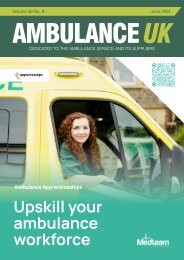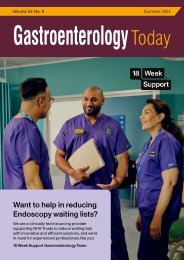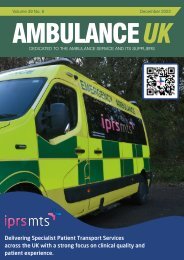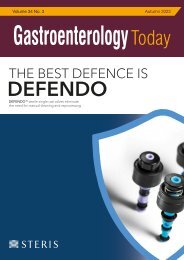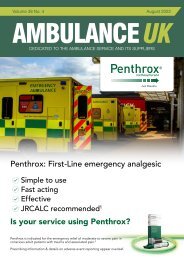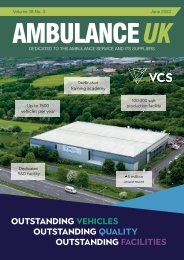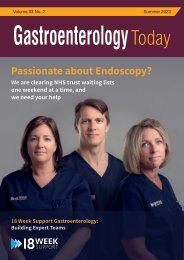Gastroenterology Today Autumn 2020
You also want an ePaper? Increase the reach of your titles
YUMPU automatically turns print PDFs into web optimized ePapers that Google loves.
GASTROENTEROLOGY TODAY - AUTUMN <strong>2020</strong><br />
NHS trusts with:<br />
2WW Urgent referrals<br />
Routine referrals<br />
ADVERTORIAL FEATURE<br />
Surveillance cases<br />
Bowel cancer screening services<br />
ENDOSCOPY ALTERNATIVES IN A TIME OF COVID:<br />
NHS Facility NHS Staff NHS<br />
INNOVATIVE THINKING AND DIFFERENT WAYS OF WORKING<br />
processes<br />
TO CLEAR NHS TRUSTS WAITING LISTS<br />
Enhanced sedation (Propofol) lists<br />
Additionally, we can support Direct Access<br />
and Rapid Access endoscopy referrals by<br />
working with the local clinical leads to agree<br />
strong governance for the management of<br />
these patients.<br />
This quarter we explore the potential for Transnasal endoscopy as a<br />
new technological alternative which may assist Trusts in managing<br />
the significant spike in diagnostics demand arising from COVID 19.<br />
Transnasal endoscopy, or TNE, is an upper GI endoscopy method which<br />
is performed by the nasal route (rather than the oral route) using a thin<br />
Criteria & Quality<br />
endoscope less than 6 mm in diameter. This technique has been shown<br />
to improve patient tolerance and is more convenient.<br />
We select Endoscopists with an endoscopy<br />
orientated career path and performance<br />
measures above the national average. JAG<br />
audit data is constantly monitored to ensure<br />
has prevented successful internal review.<br />
ongoing quality. Furthermore, we have a<br />
Sedation is not required during Transnasal endoscopy and therefore<br />
clinical governance department that is crucial<br />
to maintaining quality and safety but also<br />
provides support to both Endoscopists and<br />
ensuring diagnostics continue while, importantly, being separated<br />
the from units COVID within red zones. which Recovery we times work. are short and the patient is<br />
Unsedated conventional oral gastroscopy (c-OGD) commonly causes<br />
gagging, retching and nausea which are avoided with TNE due to limited<br />
stimulation of the tongue and soft palate, thus saving treatment time and<br />
occasional repeat patient visits where physical rejection of the camera<br />
nursing staff will not be required for monitoring patient vital signs, offering<br />
an immediate cost-saving. The procedure can furthermore be carried<br />
out in an outpatient setting with a smaller estates footprint, importantly<br />
able to leave the room and hospital immediately once the procedure<br />
is completed and without the need for further monitoring or recovery<br />
We provide tailored solutions to manage<br />
capacity from straight forward supply of staff<br />
to a team based managed solution to a full<br />
patient pathway including pathology review.<br />
facilities (Gorelick et al. 2001). There are a number of cost analyses<br />
clearly demonstrating the cost savings for TNE (Wellenstein et al. 2019;<br />
Anon n.d.; Atar and Kadayifci 2014), and these come from a combination<br />
of decreasing the cost and total duration of endoscopic procedures,<br />
increased capacity and reduced staff requirements and all while allowing<br />
deployment in safe, manageable outpatient settings.<br />
Accuracy of Diagnosis<br />
Our commitment to improving the<br />
NHS experience<br />
conventional endoscopes, thus maintaining the diagnostic accuracy.<br />
Like Current the data NHS suggests Trusts that TNE we has work better with, patient tolerance patient when<br />
care is at the centre of everything we do. By<br />
using any spare weekend capacity within a<br />
Trust, the 18 Week Support insourcing teams<br />
Training & Deployment<br />
are able to see a high volume of patients<br />
in a short space of time, in the familiar<br />
surrounding of the NHS Trust.<br />
To date, data suggests that there is preservation of the image quality of<br />
compared to unsedated endoscopy (Garcia et al. 2003; Parker et al. 2016;<br />
Schuldt et al. 2019). Nasal pain is the most significant symptom associated<br />
with endoscopic procedures but can be reduced with nasal pre-treatment.<br />
Transnasal endoscopes are very similar to standard or slim endoscopes<br />
except for their outer diameter, which is usually less than 6 mm, and a<br />
smaller working channel, of only 2 mm in diameter. The disadvantage<br />
of this smaller calibre working channel is that only specialist paediatric<br />
biopsy forceps can be used to take tissue samples. There is the risk that<br />
An ethical company<br />
We’re an ethical and transparent company<br />
that’s financially accountable and financially<br />
responsible.<br />
rooms is not required.<br />
We’re committed to the NHS<br />
14and the delivery of high-quality care, and to<br />
helping Trusts reduce RTT waiting times.<br />
histological analysis may be impaired with smaller tissue samples.<br />
Implementation of TNE requires procurement of the endoscopes and if<br />
necessary a dedicated processor. The fact that these procedures can<br />
be carried out in outpatient settings means that refurbishing hospital<br />
Clinical team<br />
There is no formal training program for TNE, but all endoscopists<br />
undertaking Trans-nasal endoscopy procedures must have JAG<br />
certification for diagnostic UGI endoscopy (oral route). However, there<br />
is a requirement to understand the nasal anatomy and how to deal with<br />
complications. There are also subtle differences to the techniques required<br />
to negotiate some aspects of the anatomy, particularly large hiatus hernias<br />
Happy patient<br />
and passage through to D2. There are training courses available, which<br />
JAG strongly recommends clinicians attend. It is recommended that<br />
ENT surgeons should be involved at local service level to understand<br />
the anatomical approach and managing complications, and to provide<br />
mentoring. It is advised that a minimum of 20 full procedures are observed<br />
Who we’re looking for<br />
and competencies met before independent practice.<br />
We are interested in meeting with Consultant<br />
Summary<br />
Gastroenterologists, senior nurses and clinical<br />
nurse specialists throughout the UK.<br />
Transnasal endoscopy offers Trusts considerable advantages and<br />
flexibility during this time of COVID. TNE can be safely and easily<br />
deployed, including in outpatient settings which makes it easy to keep<br />
Our remuneration package is second to<br />
none and is per session rather than per case<br />
which allows our teams to work in a safe and<br />
Bibliography<br />
calm environment’<br />
diagnostic patients separate from COVID red zones; accurate diagnostic<br />
results can be delivered with smaller teams and with reduced impact on<br />
the patient; and special TNE training and deployment needs are limited.<br />
Anon Cost Savings of Transnasal Endoscopy Versus Standard Endosco...: Official<br />
journal of the American College of <strong>Gastroenterology</strong> | ACG [Online]. Available at:<br />
https://journals.lww.com/ajg/Fulltext/2008/09001/Cost_Savings_of_Transnasal_<br />
Endoscopy_Versus.1037.aspx About you [Accessed: 24 August <strong>2020</strong>a].<br />
Atar, M. and Kadayifci, A. 2014. Transnasal endoscopy: Technical considerations,<br />
advantages and limitations. World journal of gastrointestinal endoscopy 6(2), pp. 41–48.<br />
If you have an excellent NHS record and<br />
Garcia, R.T., Cello, J.P., Nguyen, M.H., et al. 2003. Unsedated ultrathin EGD is well<br />
accepted when compared with conventional sedated EGD: a multicenter randomized<br />
trial. want <strong>Gastroenterology</strong> to help 125(6), clear pp. 1606–1612. NHS waiting list<br />
backlogs, reduce RTT waiting times and<br />
provide high-quality patient care, get in<br />
touch by calling on 020 3966 9081 or email<br />
Gorelick, A.B., Inadomi, J.M. and Barnett, J.L. 2001. Unsedated small-caliber<br />
esophagogastroduodenoscopy (EGD): less expensive and less time-consuming than<br />
conventional EGD. Journal of Clinical <strong>Gastroenterology</strong> 33(3), pp. 210–214.<br />
Parker, C., Alexandridis, E., Plevris, J., O’Hara, J. and Panter, S. 2016. Transnasal<br />
endoscopy: no gagging no panic! Frontline gastroenterology 7(4), pp. 246–256.<br />
Schuldt, A.-L., Kirsten, H., Tuennemann, J., et al. 2019. Necessity of transnasal<br />
gastroscopy recruitment@18weeksupport.com<br />
in routine diagnostics: a patient-centred requirement analysis. BMJ open<br />
gastroenterology 6(1), p. e000264.<br />
Wellenstein, D.J., Honings, J., Schutte, H.W., et al. 2019. Cost analysis of office-based transnasal<br />
esophagoscopy. European Archives of Oto-Rhino-Laryngology 276(5), pp. 1457–1463.<br />
18 Week Support<br />
www.18weeksupport.com<br />
Dr Matthew Banks Banks<br />
Clinical Lead for <strong>Gastroenterology</strong><br />
18 Week Support<br />
London 3rd Floor, 19-21 Great Tower Street, London EC3R 5AR<br />
Birmingham Unit 25, Lichfield Business Village, The Friary WS13 6QG<br />
GASTROENTEROLOGY TODAY - SPRING 2019



